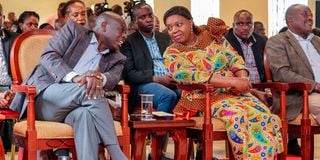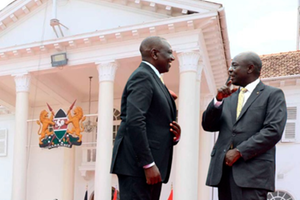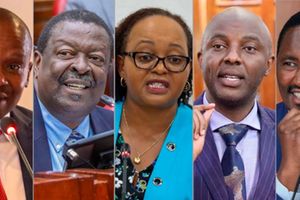
Deputy President Rigathi Gachagua with wife Pastor Dorcas Rigathi during a church service in Kiamariga, Nyeri County on July 7, 2024.
In the two recent media appearances he has had to discuss his impeachment, Deputy President Rigathi Gachagua has found himself discussing charitable initiatives run by himself and his wife.
The Rigathi Gachagua Foundation and the Pastor Dorcas Rigathi Foundation have been part of the interviews — and they have brought renewed attention towards the charitable initiatives run by politicians and their spouses plus the issues around them.
President William Ruto, Prime Cabinet Secretary Musalia Mudavadi, Azimio leaders Raila Odinga and Kalonzo Musyoka, National Assembly speaker Moses Wetang’ula and former governors Mike Sonko and Evans Kidero are among the politicians who run foundations either in person or have spouses that run non-profit entities.
According to Mr Saitoti Maika, the director-general of the Financial Reporting Centre, there are at least four legal frameworks through which foundations are registered. They include public benefit organisations under the Public Benefits Organisations Act; societies through the Societies Act; companies under the Companies Act; and trusts under the Business Registration Service.
During his interview three weeks ago, Mr Gachagua complained about how budget cuts to the office of his wife, Dorcas, had scuttled many plans for her charitable entity. He asked Kenyans of goodwill to chip in.
In the second interview last week, he said many well-wishers had lent a hand to his spouse to promote his wife’s “good work” through charity.
“She gets a lot of money in her foundation. Since a decision was made that the government will not fund the office of the spouse of the Deputy President, Kenyans of goodwill flock to her every day with cash and material donations,” said the Deputy President.
Mr Gachagua and his wife independently established their foundations within a month after taking office. Mrs Gachagua registered hers on October 19, 2022 while Rigathi Gachagua Foundation was incorporated on November 11, 2022.
Mr Gachagua said on Monday that he started the foundation to continue helping needy cases he was assisting as a Member of Parliament.
Amidst corruption and money laundering accusations, the embattled DP has rubbished allegations of malpractice fronted by Kibwezi West MP Mwengi Mutuse, maintaining that his and Dorcas’ foundations are non-profit entities that serve the public good.
His foundation, he told the Press on Monday, has only ever received Sh12 million from well-wishers.
“Honourable Mutuse has not said what crime the Deputy President has done by having a foundation that is non-profit-making,” said Mr Gachagua.
Besides having an independent website, Dorcas Rigathi Foundation is also hosted on the official website of the Office of the Deputy President.
“The Office of the Spouse of the Deputy President and Pastor Dorcas Rigathi Foundation is committed to uplifting and restoring the lives of Kenya’s most vulnerable populations, including the boy-girl child, widows, orphans, and people who are differently-abled (PWDs).
“Our mission is to empower these individuals both economically and spiritually, enabling them to achieve a dignified future through strategic partnerships,” says a post on the DP’s website.
While dismissing the allegations levelled against the Dorcas Rigathi Foundation, he termed it as “an attempt to bring my family into the mud”.
As Kenya’s political elite strive to enhance their public image and build legacies beyond politics, many have turned to charitable foundations as platforms for societal betterment to maintain visibility and continue wielding influence.
The philanthropic foundations, often backed by corporate sponsors, foreign donors and local businesspersons, address issues such as poverty, provision of clean water, education, healthcare and youth empowerment.
However, charities associated with politicians have in the past been singled out for being fronts for illicit financial activities, including money laundering and embezzlement of public funds.
According to Mr Maika, the Financial Reporting Centre boss, there are various legal frameworks to monitor foundations, depending on how they are registered.
“The entities are supervised under their different legal regimes. Through a combination of regulatory frameworks, collaborative training initiatives, and continuous monitoring, the government works closely with banks and other financial institutions to identify and report potential money laundering activities, including those involving foundations. This process is well anchored in the Proceeds of Crime and Anti-Money Laundering Act of 2009,” Mr Maika told Nation.
“When foundations open bank accounts, they are required to disclose their beneficial owners, thereby reducing anonymity in financial transactions, and where politically exposed persons are involved, financial institutions are required to conduct enhanced due diligence. This includes verifying sources of funds. Equally, the Public Benefit Organisations Act obligates non-governmental organisations to disclose sources of funding,” he added.
Politicians and foundations are joined in the hip. In the case of President William Ruto, his wife’s initiative is the most pronounced through programmes under Mama Doing Good. One of the most prominent is the Joyful Women Organization (Joywo), it was founded by Mrs Ruto in 2009 “with an aim of empowering women economically through financial inclusion, skills development, market access and linkages to meet their basic needs and fulfill their potential”.
Through the initiatives, Mrs Ruto is not only extending her philanthropic image but also contributing to her husband’s political narrative of economic empowerment and improving the livelihood of women.
In May 2020, Joywo benefited from the Ford Foundation, getting a grant of Sh13.7 million to support automation of operations for institutional strengthening.
In this way, her foundation serves both philanthropic and political functions, keeping her in the public eye as a supporter of grassroots economic growth.
On the other hand, the ongoing impeachment motion against DP Gachagua has raised the lid on the intriguing convergence of politics and philanthropy.
Mrs Ida Odinga, the wife of former Prime Minister Raila Odinga, started her foundation in 2010 to advocate for women’s education and empowerment. Ida Odinga Trust focuses on providing scholarship, mentoring and leadership training to young women, especially in rural areas.
On his part, Mr Odinga also uses the Jaramogi Oginga Odinga Foundation to champion political and social causes in line with the first Vice President’s ideals of democracy, equality and national unity.
Sometimes, politicians’ foundations become theatres of political squabbling. When the Kalonzo Musyoka Foundation was flagged over failure to account for Sh196 million in 2020, the Wiper leader accused the Non-Governmental Organisations Coordination Board of engaging in political persecution.
The then NGO board CEO Fazul Mahamed alleged an existence of secret, illegal and unauthorised accounts in contravention of the law.
During the same period, the NGO board also raised concerns with a foundation associated with the then Nairobi Governor Evans Kidero over an alleged Sh2.7 billion in its account.
Defending himself, Dr Kidero dissociated himself from the foundation, saying Evans Kidero Foundation is a different entity from him.
Elsewhere, Mr Mudavadi is involved in the Mudavadi Foundation, which was established in 1997 with a focus on education, health and socio-economic development.
Sonko Rescue Team, a private charitable organisation initiated by flamboyant Nairobi politician and former Nairobi Governor Mike Sonko, provided various forms of humanitarian aid including ambulance and medical and funeral hearse services, garbage collection, among others.
Although the team was highly appreciated for its swift and visible efforts to support the needy, critics pointed out that it blurred the lines between philanthropy and politics.
Other notable politicians with foundations include former ICT Cabinet Secretary Eliud Owalo and National Assembly Speaker Moses Wetang’ula.
The Financial Reporting Centre is intensifying its scrutiny of political foundations in response to rising concerns about money laundering activities linked to these entities.
“To protect legitimate donors from inadvertently contributing to money laundering through political foundations, Kenya conducts periodic risk assessments to establish risk of abuse of such entities for money laundering and apply anti-money laundering measures that correspond to the level of risk. There is also close supervision and monitoring by regulators,” said Mr Maika.
“Meanwhile, reforms are ongoing following the movement of the registration and administration of trusts from the Ministry of Lands to the Business Registration Services,” he noted.












